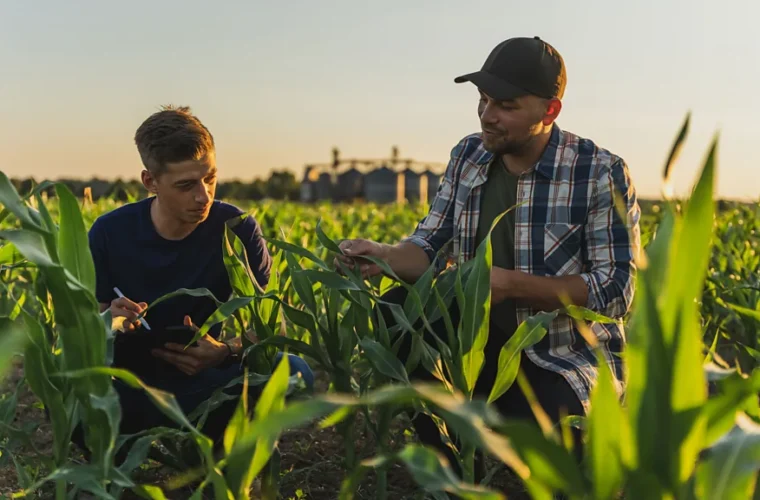To sustain our lives and ensure longer life expectancy, humans need to eat nutritious food. It does not sound like a big problem at all, as we could simply go down to local shops or restaurants to get food and drinks we like — for now.
The number of people who are living on this planet is 7.7 billion as of 2019, including people and countries whose food security is already under threat. By the year 2050, the total human population will reach over 9.6 billion, which is about a 24 percentage point increase from the 2019 record, according to the Food and Agriculture Organisation of the United Nations.
What’s worse, the amount of food production might not be able to catch up with the population growth. The report from the UN expected the food production has to increase by 70 per cent to feed the future population. This estimation is based on the limited amount of farmland and freshwater, and inconsistent weather conditions due to climate change.
To deal with this imminent challenge ahead, many farmers around the world started to adopt emerging technologies that have not been conventionally in use for farming. This new concept of farming started to be called “smart farming” a couple of years ago.
Some start-ups in South Korea also joined in the competition to ensure the food security of the planet.
What Is Smart Farming?
Smart farming is an umbrella term for all farming methods with the use of modern information and communication technologies. The purpose of smart farming is to improve the quantity and quality of their farm products, such as grains and meat. With the help of modern technologies, smart farming also aims to minimise operational costs and optimise the labour-power in use.
Sensors are one of the most representative adapted tools for smart farming, for example. Farmers can remotely manage temperature, water, and light in the farm with the sensors and controllers. Some farmers also try to predict their production with data analytics and software. They study how much they or other farmers could produce at similar conditions and try to find data-driven solutions.
However, smart farming is not an option for all farmers, especially for those who do not have enough money to make a huge initial investment in technologies. The cost of infrastructure can be different in a vast range, depending on what farmers want.
Furthermore, smart farming relies on the connectivity of the internet, which means farmers would still have to consider the maintenance cost of the internet connection. Farmers wouldn’t have to pay anything for the internet if they didn’t use internet-run devices or technologies in the first place.
Despite such drawbacks, proponents of smart farming still think that smart farming could be an efficient way of reducing the labour cost in the longer term. Also, considering the spread of COVID-19, smart farming can be a way to contain the virus, by using autonomous, non-contact tools.
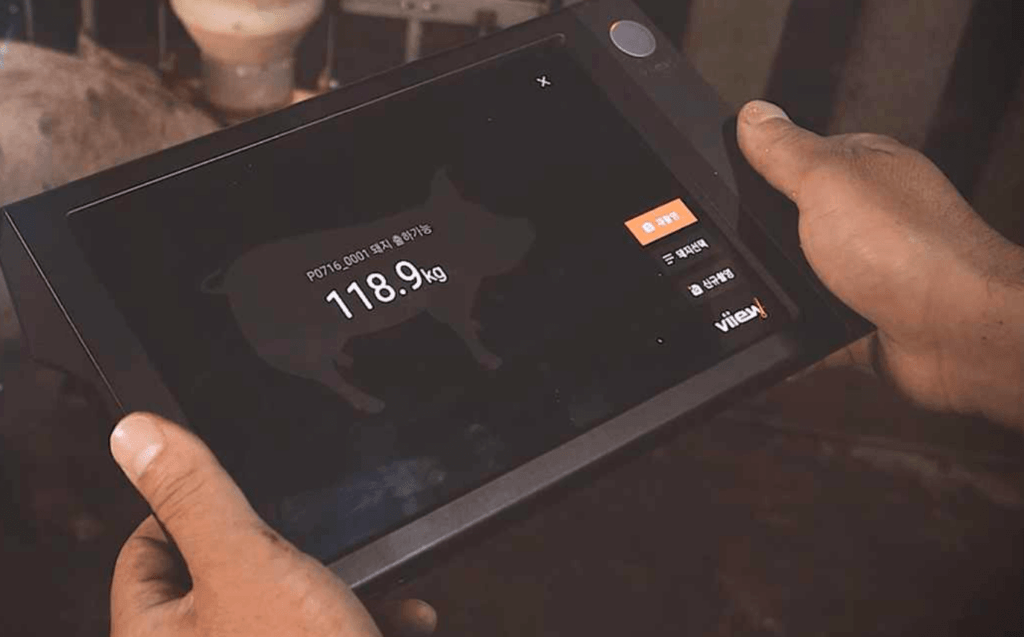
VIIEW: Estimate Pigs’ Weight with a Portable Device
Illuvation, a tech start-up based in Daejeon, South Korea, launched a mobile scale for farm pigs. The device, dubbed as VIIEW, looks like a tablet computer but it works as a portable scale, with radars and a camera attached, to weigh pigs from a distance.
How to use this portable scale is quite simple. The user should stand about a metre away from a pig that the user wants to weigh. Then the user should take a side-profile photo of the pig as if they would with a smartphone. The pig’s estimated weight then would appear on the screen in less than five seconds.
According to the official brochure of VIIEW, the device has an approximately 95 per cent of accuracy rate in estimating pigs’ weight.
“VIIEW is built on two years of collected data of pig farms,” Song Min-soo, sales manager at Illuvation told 4i Magazine. “We took pictures of pigs, one by one, from farms partnered with our company. Then we designed the device to become more accurate with the accumulated data from the users (added to the base data).”
What makes VIIEW more special is the use of 3D scanning technology, which scans the captured photo and processes it into 3D data. Song explained that this was an idea suggested by their Chief Executive Officer, Won Hyung-pil.
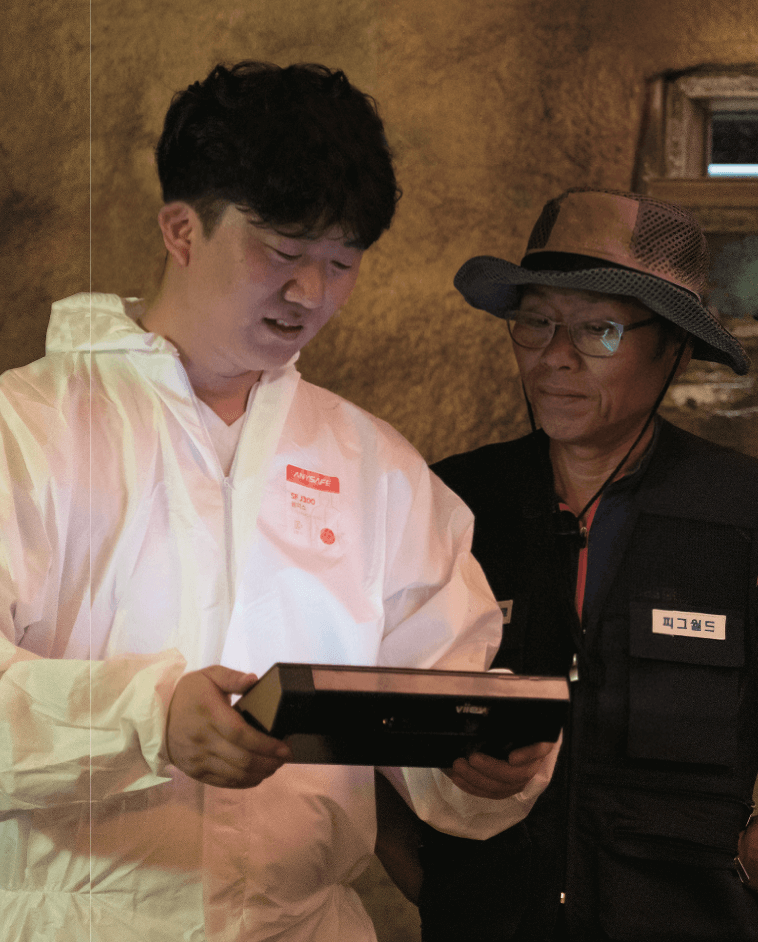
“Our CEO used to work in a company related to 3D printing technologies,” he said. “He then came across an idea of scanning farm animals.”
Illuvation believes that their product VIIEW will come in handy for many farmers who wish to pay less labour cost and improve the quality of meat.
For one, using this device would need only one person to weigh the pig within seconds, unlike the conventional way — it needed two people to carry a pig to the scale. Also, the pigs won’t need to stay still as they used to on a scale.
“As of today, around 40 farmers are using our product,” Song added.
“We are receiving great feedback from our users, especially from those who want to receive a higher quality grade. We found out that our users’ pigs had five per cent of higher quality grades (compared to farmers who do not use VIIEW).”
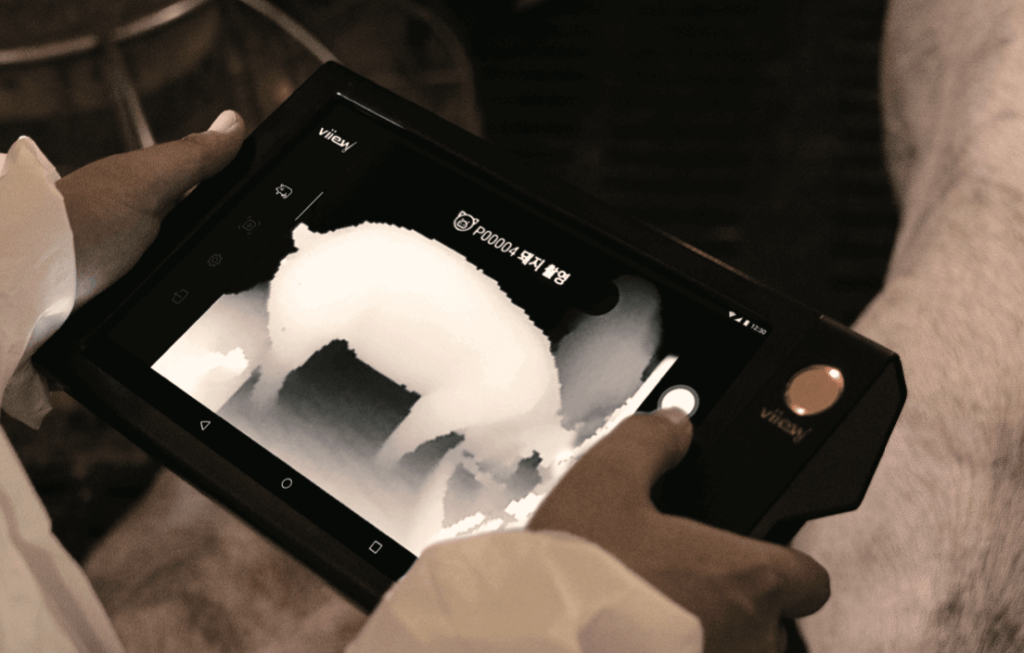
CUBE: Improve Your Production with a Vertical Hydroponics Farm
Some farmers turned their eyes to the ways of planting crops even on lands that are not suitable for crops and grains. N.THING, a Seoul-based Agri-tech company, is one of such companies that developed fast globally by introducing a modular container vertical farm called CUBE.
N.THING explains the CUBE is a modularised container vertical farm powered by hydroponics, which uses nutritious water instead of soil in growing plants. The company also developed a dedicated software named CUBE OS and used IoT technology to enable farmers to check their farm’s growth conditions and product quality.
This vertical farm of containers is “pollution-free”, “pesticide-free”, “contamination-free,” says Leo Kim, CEO of N.THING.
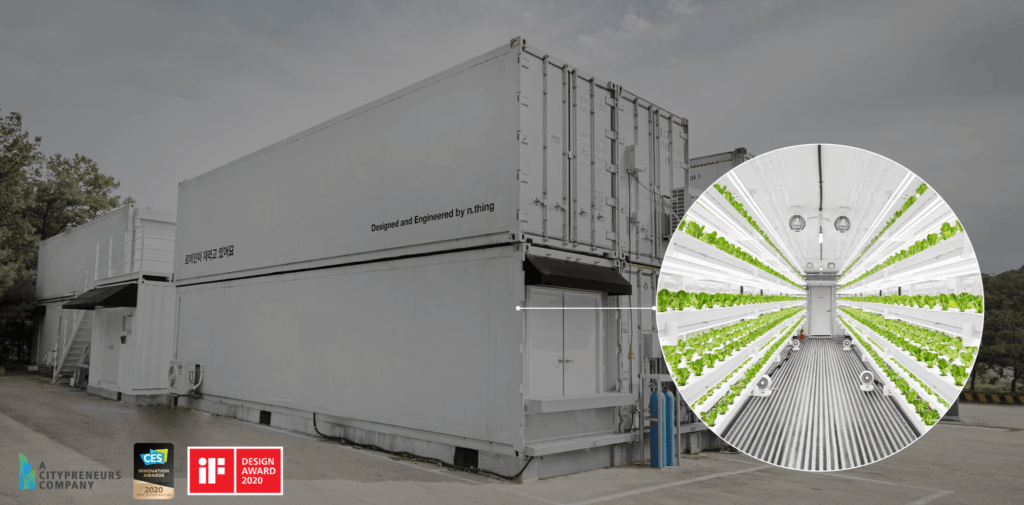
“As our vertical farm does not use soil, farmers would not have to worry about soil contamination or pesticides,” he said. “The farm does not make any farm waste, such as plastic films or vinyl packages, and uses about 98 per cent less freshwater compared to the conventional farming.”
With CUBE, farmers would not have to worry about the outdoor weather conditions as all conditions can be controlled inside the containers. Currently, all growing processes can be autonomously operated and controlled remotely, even for big-sized farms.
Since the foundation, N.THING has considered many different farming methods to improve the quality and quantity of farming production. They finalised their product as a vertical container farm after visiting many experts in the field.
“Data collection was the most difficult part in completing our product,” he said. “Our engineers, technical experts, and programmers visited experts from the agriculture industry to learn (what is the most suitable environment for crops and plants). Also, they visited professional chefs and nutritionists to set standards for high-quality plants with great flavour and taste.”
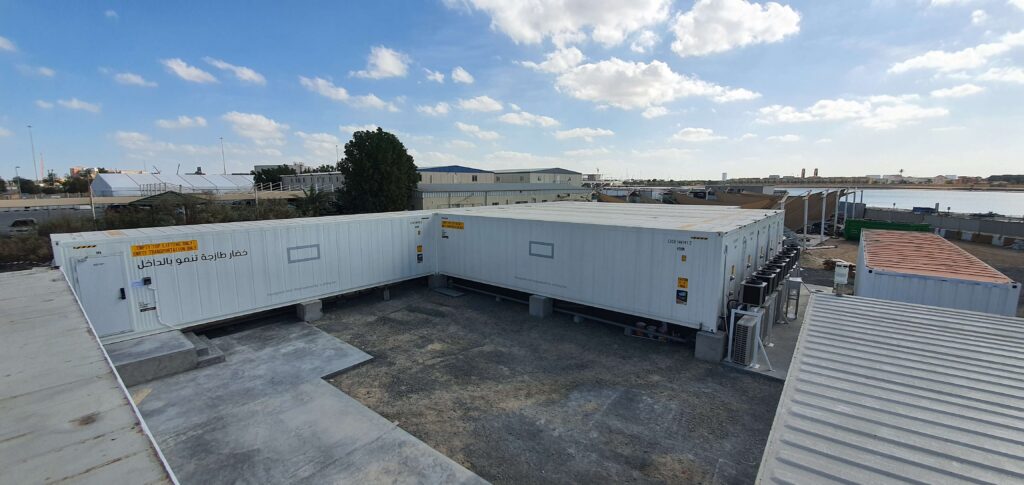
One of the biggest strengths that CUBE has is that it does not require many people to run the farm. According to N.THING, it needs only one or two people per container to make sure the farm operates with no problem.
“This is good for a country like South Korea, where the population is on a constant decrease at the moment,” Kim said. “While the traditional farming methods rely heavily on labour-power, our farm wouldn’t need that many workers.”
N.THING now aims to cooperate with countries that import their food from other countries. Their initial target is countries in the Middle East. They exported its vertical farms, valued at $3 million, to the United Arab Emirates recently.
“With the pandemic, Middle East countries that heavily relied on imported foods faced some food security challenges due to trade protection and travel bans,” Kim said. “We plan to sell other crops that are technically confirmed, along with already commercialised crops to those countries.”
Kim also hopes that his smart farming company can contribute to changing people’s perceptions of farming.
“Some people in South Korea think that agriculture is not an easy industry to work in,” he said. “I hope farmers can be considered more as content creators or data scientists who try to provide delicious and clean foods to people.”

